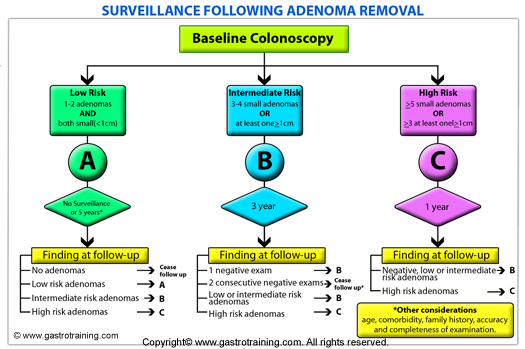Colorectal cancer screening
Summary of recommendations for colorectal cancer screening and surveillance in high risk groups
British Society of Gastroenterology Guidelines 2010
British Society of Gastroenterology guidelines for follow up after resection of colorectal cancer
- It is reasonable to offer CT imaging of the liver to asymptomatic patients within 2 years after potentially curative resection.
- Although there is no evidence that colonoscopic follow-up improves survival, it does yield some treatable tumours. It is recommended that a colonoscopy is done 5 years after surgery and thereafter ever y 5 years until the bene?t is outweighed by co -morbidity. Patients found to have adenomas at the time of diagnosis of colorectal cancer or on follow-up surveillance should follow adenoma surveillance guidance, continuing surveillance at least 5-yearly until bene?t is outweighed by co morbidity.
British Society of Gastroenterology guidelines for colorectal cancer screening and surveillance in moderate risk family groups
| Moderate risk family history categories | Life time risk of CRC death without surveillance | First screening colonoscopy | Screening interval |
| CRC in 3 FDR in first degree kinship, none < 50 yrs | 1 in 6-10 | 50 yrs | 5 yrly to age 75 yrs |
| CRC in 2 FDR in first degree kinship, mean age <60 yrs | 1 in 6-10 | 50 yrs | 5 yrly to age 75 yrs |
| CRC in 2 FDR >= 60 yrs | 1 in 12 | 55 yrs | Once only colonoscopy at age 55 yrs. |
| CRC in 1 FDR < 50 yrs | 1 in 12 | 55ys | Once only colonoscopy at age 55 yrs. |
| All other FH of CRC (see note below) | >1 in 12 | None | NA |
First degree kinship: Affected relatives who are ?rst-degree relatives of each other AND at least one is a ?rst degree relative of the consultand.
NB- All other FH of CRC: should be reassured and encouraged to avail themselves of population-based screening measures. The low level residual risk over that of the general population should be explained. Furthermore, because the population lifetime risk in the UK is around 1:20, some people without any family history will develop colorectal cancer, and this residual population risk should be made explicit.








